Featured
FOCUS ON RECYCLING IMPEDES PROGRESS ON PLASTIC POLLUTION |
|
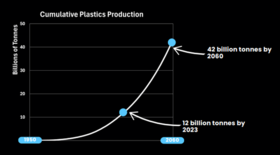
|
A report by REUSE Foundation, Where Now for Plastic Packaging?, shows how plastic recycling is failing and taking effort from more effective solutions.
The report points out that while corporations and NGOs like WRAP and Ellen MacArthur Foundation promote plastics recycling and making plastic packaging ‘recyclable’, average plastic recycling rates globally are around 9% and are on track to be only 17% by 2060 according to OCED data. Moreover, plastic that gets recycled is mostly downcycled, soon to become unrecyclable waste. With global plastic production expected to triple by 2060 and growing evidence plastic packaging leaks into our environment and greatly impacts ecological and human health, promoting recycling is misguided. The report argues for solutions that shift us from disposability to reuse systems that prevent waste. |
Highlights
Washington Enacts EPR Law For Packaging Waste |
|
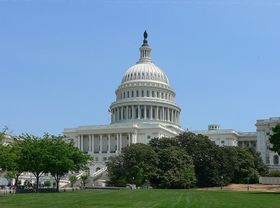
|
Washington became the seventh US state to implement an extended producer responsibility law for packaging. The Recycling Reform Act mandates producers to fund 90% of the state’s recycling system by 2032, phased in gradually from 2030. It requires establishing a statewide recycling collection list, expanding curbside recycling and setting minimum worker compensation at material recovery facilities. Exemptions apply to certain food and medical packaging, and materials with a 65% recycling rate for three consecutive years. Other states, including New York, Massachusetts and New Jersey, are considering similar measures.[Image Credit: © Creative Commons Attribution-Share Alike 3.0 Unported]
|
UK Supermarkets Criticized For Excessive Plastic Use |
|
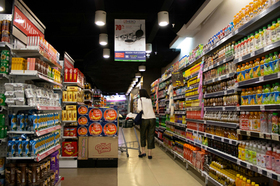
|
A survey by Nature 2030 reveals growing public frustration over UK supermarkets' excessive use of single-use plastics, with 80% of respondents stating that supermarkets use too much plastic and over two-thirds believing they prioritize profits over the environment. Despite the government's planned deposit return scheme for single-use bottles set to launch in 2027, critics argue it is insufficient given the anticipated rise in plastic production. Environmental groups claim that supermarkets are delaying meaningful action, pointing to their recent push to postpone the DRS. [Image Credit: © Hobi industry from Pexels]
|
SC Johnson Eliminates Black Plastic From Mrs. Meyer’s Packaging |
|

|
SC Johnson is phasing out black plastic from Mrs. Meyer’s brand packaging to address recycling challenges. Black plastic often contains carbon black pigment, which is difficult for near-infrared scanners in recycling facilities to detect, leading to disposal in landfills. The company began rolling out neutral caps for Mrs. Meyer’s products in the UK in September 2021, with plans to eliminate black plastic across all product lines by 2026. Additionally, SC Johnson is adopting more recyclable materials, such as HDPE for Method® dish soap refills and paperboard for Duck® and Glade® packaging. [Image Credit: © S.C. Johnson & Son Inc./The Caldrea Company]
|
Reusable Packaging: A Missed Opportunity or Future Standard? |
|
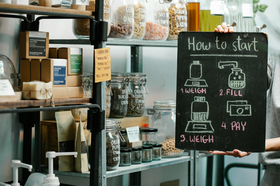
|
Victoria Baker of Ecosurety questions whether the rising costs of single-use packaging under Extended Producer Responsibility schemes present a critical moment to push reusable packaging into the mainstream. Despite high-profile trials and consumer demand for reuse and refill systems, scaling these initiatives remains challenging due to inconsistent investment and logistical complexities, but some argue they have not been given the same opportunities as single-use systems. Baker suggests that the key to widespread adoption lies in simplifying reuse processes for consumers and aligning industry practices through collaboration and standardization. She points to France as a model, where public policy mandates reuse targets and allocates EPR budgets to support reuse infrastructure. [Image Credit: © Sarah Chai on Pexels]
|
Lucozade Redesign Cuts 956 Tonnes Of Plastic Annually |
|
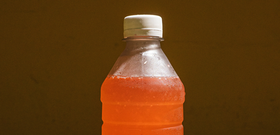
|
Suntory Beverage & Food GB&I introduced a new Lucozade Energy bottle design that reduces plastic usage by 956 tonnes annually. The redesigned bottles feature a half sleeve covering only 50% of the bottle height, reducing sleeve weight by 60%. SBF GB&I invested £6.3 million in the packaging overhaul, which required a complete redesign of the bottle and production line adjustments. It also improves recyclability, enabling the bottles to be sorted more effectively into the clear plastics stream at recycling facilities. [Image Credit: © Fotografía de Alimentos on Unsplash]
|
Biffa’s Roger Wright On Driving Packaging Sustainability |
|
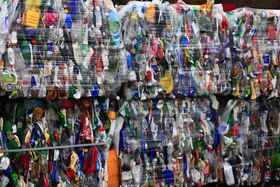
|
Roger Wright of Biffa Waste Management discusses the company’s role in advancing sustainable packaging at Rethinking Materials in London. Biffa collaborates with brands like Suntory to redesign packaging for recyclability – for the Ribena bottle project, which moved from a full-sleeve PP label to a more recyclable design. Wright highlights the importance of scalable, standardized solutions, noting how AI technologies like Greyparrot and Polytag aid waste tracking and recycling validation. He also said that the the UK’s upcoming Deposit Return Scheme will further streamline recycling, particularly for PET bottles and aluminium cans, and urges brands to standardize packaging formats, explore post-industrial plastic reuse and embrace collaborative approaches to achieve sustainable packaging goals.[Image Credit: © Nareeta Martin on Unsplash]
|
NLPC Urges More Scientific And Economic Analysis In Plastics Packaging Policies |
|
.png?width=280)
|
The National Legal and Policy Center is sponsoring shareholder proposals at Colgate-Palmolive and Walmart this spring, calling for companies to apply more rigorous, objective scientific and economic analysis in their plastic packaging policies. This marks a shift for NLPC, which previously focused on shareholder proposals related to diversity, equity, and inclusion policies. NLPC criticizes what it calls “fake environmentalism” or “virtue-signaling” by companies spending heavily on plastic packaging changes that may not deliver genuine environmental benefits or financial returns. At Colgate-Palmolive’s recent meeting, NLPC challenged the company’s claims about the recyclability of its 100% high-density polyethylene toothpaste tubes and questioned the cost-effectiveness and environmental impact of using recycled plastics in some products. Walmart’s annual meeting is scheduled for June 5. [Image Credit: © Colgate-Palmolive Company]
|
Some Bioplastics May Be As Harmful As Traditional Plastics |
|

|
New research reveals that starch-based bioplastics, often considered a sustainable alternative to petroleum-based plastics, could pose similar health risks. The study exposed mice to bioplastic-contaminated food and water. It found microlesions, metabolic disruptions and organ damage similar to problems caused by conventional plastics. Researchers noted that bioplastics, made from corn or rice starch, can shed microplastics that accumulate in tissues, affecting the liver, ovaries and gut microbiota. Despite being promoted as a safer option, bioplastics may contain toxic chemicals that disrupt hormonal and metabolic pathways, and the report authors recommend more research in the area. [Image Credit: © Towfiqu barbhuiya on Pexels]
|
Amazon Develops Sustainable Food Packaging And Recycling Solutions |
|

|
Amazon's Sustainable Materials Innovation Lab in Seattle is exploring bio-based plastics to replace traditional plastic in food packaging, testing biopolyesters for durability and recyclability, aiming for a system where biopolyesters can be easily sorted and recycled in existing facilities. To further this goal, Amazon is partnering with companies like Glacier, which uses AI to sort recyclables more accurately, and EsterCycle, which chemically recycles compostable plastics. Novamont is testing bio-based grocery bags in Amazon Fresh stores in Spain; Whole Foods locations in Seattle are trialing produce bags made from biopolyesters.[Image Credit: © Amazon.com]
|
Ziploc Faces Lawsuit Over Microplastic Risks |
|
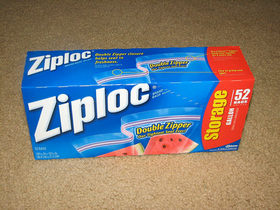
|
SC Johnson brand Ziploc is facing a class-action lawsuit over misleading claims about its bags being "microwave safe" and "suitable for freezer use." The lawsuit argues that these bags release microplastics when microwaved or frozen, which can pose health risks. Ziploc bags use polyethylene and polypropylene, which are linked to microplastic contamination, potentially exposing consumers to harmful particles during routine kitchen use. [Image Credit: © JamieS93 ]
|
Plastics Disrupt Circadian Rhythm, Mimic Caffeine Effects |
|

|
New research finds that chemicals in everyday plastics, such as PVC and polyurethane, may disrupt the body’s natural sleep-wake cycle in a way similar to caffeine. It found plastic chemicals activate the adenosine receptor, delaying the circadian rhythm by up to 17 minutes. This receptor typically signals the body to wake up, but when disrupted, it may impair sleep and other physiological processes. Researchers call for further studies and regulatory action to mitigate plastic chemicals' impact on health, particularly focusing on complex compounds within PVC.[Image Credit: © Sam Jotham Sutharson from Pixabay]
|
SC Johnson Refill Station Reduces Plastic Waste |
|
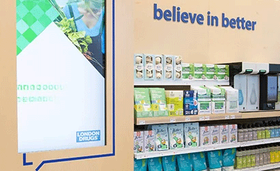
|
Retailer London Drugs partnered with SC Johnson to introduce a refill station at its new concept store in Burnaby, British Columbia. It allows customers to replenish Method and Mrs. Meyer’s hand and dish soaps using reusable pouches, potentially reducing plastic use by up to 93%. The initiative is part of London Drugs' broader commitment to sustainability, featuring a store design centered on assistance, personalization, community and discovery. SC Johnson's CEO, Fisk Johnson, emphasizes the importance of convenience in promoting refill and reuse systems and advocates for regulatory measures to support their adoption. [Image Credit: © London Drugs]
|
BPF Urges Action On Misleading Recycled Claims |
|
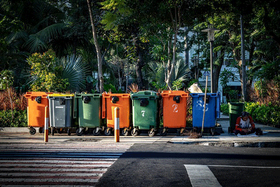
|
The British Plastics Federation calls for stricter enforcement against companies making false claims about recycled content in plastic packaging, suggesting misleading statements undermine the UK's Plastic Packaging Tax. Industry experts, including RECOUP, believe inadequate verification allows some producers to falsely claim compliance, distorting the market. To help combat this, the BPF is asking for robust certification systems and third-party audits to ensure transparency and maintain consumer trust. [Image Credit: © Niko Lienata from Pixabay]
|
UK Appoints Operator For National Deposit Return Scheme |
|
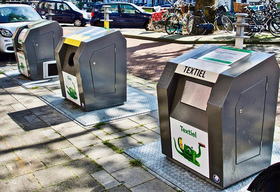
|
The UK Government appointed UK Deposit Management Organisation Ltd. to oversee the deposit return scheme for single-use plastic and metal drink containers in England, Northern Ireland and Scotland. Set to launch in October 2027, the scheme will require consumers to pay a small deposit on containers made from PET plastic, steel and aluminium, refundable upon return. The initiative aims to reduce litter and increase recycling rates, targeting 6.5 billion discarded containers annually. UK DMO, a not-for-profit entity, will manage logistics, fraud prevention and public communications and is governed by a diverse board representing producers, retailers and environmental groups[Image Credit: © Siggy Nowak from Pixabay]
|
Coca-Cola Revises Recycling Claims Amid EU Scrutiny |
|

|
Coca-Cola agreed to amend its recycling-related labels across Europe following a greenwashing complaint by the European Consumer Organisation and its partners. The company will clarify that statements like “100% recycled plastic” apply only to the bottle's body, excluding caps and labels, and will remove misleading phrases such as “Recycle me again”. BEUC warns that small-print disclaimers are insufficient and urges regulators to ensure that beverage companies fully comply with EU rules on fair marketing and environmental claims.[Image Credit: © The Coca‑Cola Company]
|
P&G’s Path To Sustainable Packaging Solutions |
|
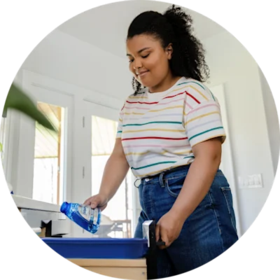
|
Procter & Gamble says it’s driving sustainability through strategic partnerships and innovations aimed at creating a circular economy, focused on designing recyclable packaging and using more recycled content, such as with the transition to recyclable bottles for Vicks DayQuil and NyQuil. P&G is also improving recycling systems in the US and supporting emerging markets with startups to boost recycling infrastructure. P&G is advancing refill and reuse models, for example with Dawn Powerwash, to minimize plastic waste, and developed new recycling technologies such as VersoVita™ to turn used plastics into high-quality material for reuse. [Image Credit: © Procter & Gamble]
|
India Increasingly Adopting Reuse Models To Combat Plastic Waste |
|

|
India is advancing reuse and refill models to reduce plastic waste, driven by government initiatives and corporate pilots. The Ministry of Housing and Urban Affairs promotes a circular economy, while companies like Hindustan Unilever and InfinityBox are exploring refill stations and reusable cutlery systems. However, scaling remains challenging due to infrastructure gaps, high costs and consumer resistance. Startups like Cupable and Srishti Lifescience are innovating with deposit-refund models and refillable water systems, achieving cost parity with single-use plastic. [Image Credit: © Monfocus from Pixabay]
|
Aldi And Ocado Reuse Trials Succeed |
|
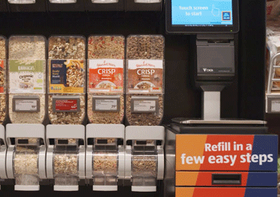
|
Aldi and Ocado's trials under the Refill Coalition demonstrate that reusable packaging systems can outperform single-use plastics. Aldi's in-store refill stations achieved up to 57% refill rates, while Ocado's online returnable containers reached 43% of weekly sales at their peak. An independent life cycle analysis indicated that reusable vessels become environmentally superior after just two uses. Customer feedback was overwhelmingly positive, with high satisfaction ratings and a 96% repurchase intent for Ocado's offerings. Aldi concluded its pilot in March 2025 after its grant funding stopped.[Image Credit: © Unpackaged Systems Ltd/Refill Coalition]
|



